News
FM regrets EU adopting one-sided resolution on Sri Lanka
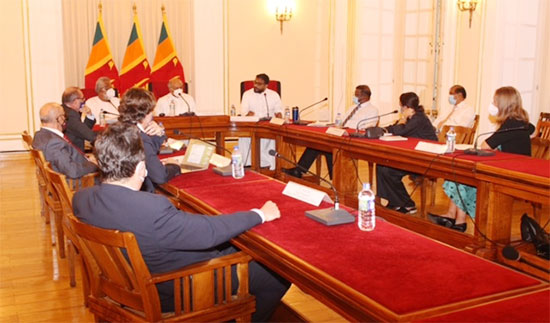
Foreign Minister Dinesh Gunawardena briefing Chargé d’Affaires of the Delegation of the European Union in Colombo Thorsten Bargfrede, and EU Ambassadors / Chargé d’Affaires from France, Italy, Romania, Germany and the Netherlands at a meeting at the Foreign Ministry on Monday. Minister of Fisheries Douglas Devananda, State Minister for Regional Cooperation Tharaka Balasuriya, and Foreign Secretary Admiral Prof. Jayanath Colombage also participated in the meeting.
The Foreign Ministry yesterday expressed its regrets at the adoption of a resolution on Sri Lanka in the European Parliament on 10 June 2021.
The resolution titled “The Situation in Sri Lanka, in particular the arrests under the Prevention of Terrorism Act”, contains factual inaccuracies, and does not take cognizance of the multifaceted progress made by Sri Lanka in reconciliation and development, the Ministry said in a statement.
The FM statement: “At the outset, the Ministry wishes to state that provisions of the Prevention of Terrorism Act have been invoked to address heinous acts of terrorism committed on its people. In this context, it is recalled that the Easter Sunday terrorist attacks of 2019 resulted in significant loss of life, including of several EU nationals.
“It is important to underscore that the Government of Sri Lanka maintains a regular, vibrant and cordial dialogue with the European Union (EU), covering all aspects of bilateral relations. The engagement is sustained through the close and cordial dialogue maintained with the European Commission, the Council and the Parliament by the Sri Lanka Mission in Brussels; and with the EU delegation and EU Ambassadors in Colombo by senior interlocutors of the Government.
“As part of this process, Sri Lanka has constructive engagement with the European Commission on the review of its EU GSP + compliance with the 27 core International Conventions. Towards this end, the Third Cycle of Review of the EU GSP + Monitoring Process for 2020-2021 is ongoing.
“Sri Lanka apprised the EU on progress with regard to its wide range of cooperation at the annual EU-Sri Lanka Joint Commission, the 23rd session of which was convened in January 2021. Further updates are provided through the relevant Working Groups and Committees functioning under the purview of the Joint Commission.
“With regard to salient points referred to in the resolution, the Ministry wishes to submit the following observations with a view to correction.
“The Government has, in accordance with its constitutional mandate and international obligations, taken steps to protect the rights of all its citizens. Specific provision in terms of Article 12 (1) of Sri Lanka’s Constitution ensures that all persons are equal before the law and are entitled to the equal protection of the law. Article 12 (2) of the Constitution prohibits discrimination based on race, religion, language, caste, sex, political opinion, place of birth or any such grounds.
“The government is in the process of revisiting provisions of the Prevention of Terrorism Act, in keeping with its commitments, as has been communicated to the EU. Towards this endeavour, the Government is studying existing legislation to propose necessary amendments, and will also draw on international best practices adopted by other jurisdictions. The Government rejects the claim that the PTA has been systematically used for arbitrary arrests and the detention of Muslim or other minority groups in Sri Lanka.
“It is observed that the 20th Amendment was enacted in full compliance with the procedure set out in the Constitution with a two-thirds majority of the Members of Parliament voting in its favour. With regard to such legislation, a number of in-built safeguards relating to transparency and judicial review aimed at preventing the passage of bills that are inconsistent with the Constitution, including its Fundamental Rights chapter, have been adhered to.
“The government has regularly updated the Human Rights Council as well as EU interlocutors on the measures undertaken to address issues of accountability, and to achieve continued progress in reconciliation. Mechanisms in place in this regard include the Presidential Commission of Inquiry headed by a Justice of the Supreme Court; the Office of Missing Persons; the Office of Reparations, the Office of National Unity and Reconciliation; the Human Rights Commission of Sri Lanka; and related institutional reforms aimed at non-recurrence and other confidence building measures. With regard to sustainable development, the Inter-Ministerial Committee headed by the Prime Minister to steer SDG implementation is of significance.
“Sri Lanka’s labour rights, including health and safety conditions, are in compliance with ILO standards. Sri Lanka’s high labour standards maintained in production, have led to better quality products, and high value added exports, as reflected in the apparel sector. The higher demand for ‘ethical’ products from Sri Lanka has led to increased production, subsequent investment, and improvement of the human capital in Sri Lanka. The EU GSP + concessions have contributed significantly towards this process, thus benefiting the Sri Lankan economy, as well as the EU market. Similarly, the fishery sector is a notable growth sector which has benefited from EU GSP + concessions.
“Sri Lanka, as one of the oldest parliamentary democracies in Asia, has a longstanding vibrant democracy. The country’s robust foreign policy is based on the principles of neutrality, non-alignment and friendship. The Government is committed to further strengthening its democratic institutions. As asserted by the Spokesperson of the 06th EU Election Observation Mission to Sri Lanka in November 2019, which comprised Members of the EU Parliament, the peaceful environment in which the election unfolded ‘confirms the stability of the [country’s] democratic institutions.’ These remarks remain valid.
“The COVID-19 pandemic continues to have a devastating impact globally, placing drastic limitations upon the right to safety, health, economic security, and even the right to life of millions of people across the globe. Sri Lanka continues to face challenges in spite of consistent and concerted efforts by the Government to safeguard its entire population against the pandemic, and to provide equitable access to vaccines. In this backdrop, the Government appreciates the commitment of global multilateral institutions and UN agencies to uphold the economic, social and cultural rights of all peoples, which are intrinsically linked to civil and political rights. Sri Lanka’s commitment to upholding human rights continues in tandem with its current priorities of inoculating its targeted population, providing healthcare and economic revival.
“In these critical times, Sri Lanka should be supported in safeguarding the rights of its people, while taking cognizance of demonstrated progress on the ground. The Government of Sri Lanka looks forward to continuing its partnership with the EU on a broad range of issues, and reassures the EU of its continued commitment to engage proactively and productively on areas of mutual interest.
“Foreign Minister Dinesh Gunawardena briefed Chargé d’Affaires of the Delegation of the European Union in Colombo Thorsten Bargfrede, as well Colombo-based EU Ambassadors / Chargé d’Affaires from France, Italy, Romania, Germany and the Netherlands, on the Sri Lanka Government’s position as detailed above, at a meeting convened at the Foreign Ministry on Monday 14 June 2021. The Minister of Fisheries Douglas Devananda, State Minister for Regional Cooperation Tharaka Balasuriya, and Foreign Secretary Admiral Prof. Jayanath Colombage also participated in the meeting.”
News
Plans for 2026 on the journey towards a digital economy Under President’s review
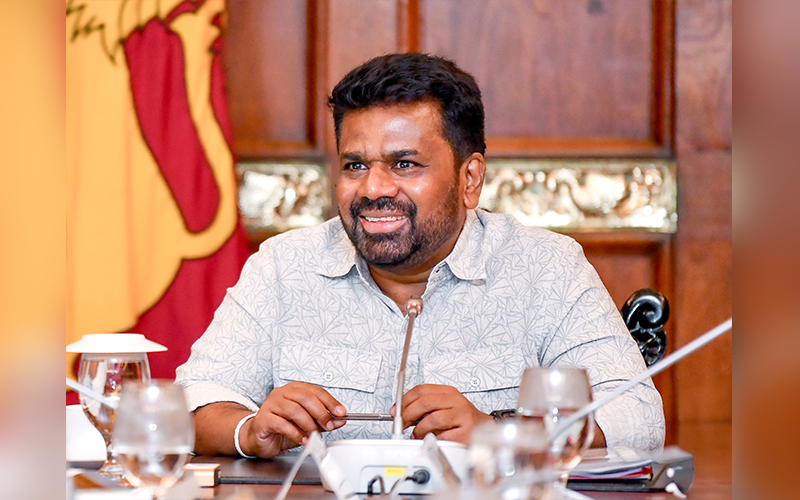
A discussion to review the progress of projects implemented under the Ministry of Digital Economy in 2025 and to examine new projects planned to be implemented under the 2026 budgetary allocations was held on Monday (19) morning at the Presidential Secretariat under the patronage of the Minister of Digital Economy, President Anura Kumara Dissanayake.
Special attention was paid to the plans and progress of programmes to promote a cashless economy.
Accordingly, an extensive discussion was held on the progress of projects planned by the Government to promote a cashless economy in Sri Lanka, including the digitalisation of government institutions, promotion of QR transactions, establishment of a Cloud infrastructure centre, a national programme to provide high-speed broadband facilities, provision of single-window facilities, the digital identity card project and the project to digitalise payment of traffic spot fines.
Noting that much of the economic activity of rural communities remains in the informal sector, the President emphasised the need to formally document these activities and stressed that this is essential when formulating future economic and development plans.
The performance, progress and future plans of institutions under the Ministry of Digital Economy, including Sri Lanka CERT, the Data Protection Authority and the Telecommunications Regulatory Commission (TRC), were also reviewed.
The current status and new recruitments of the GovTech institution, established to implement the Government’s digitalisation programme, were also discussed.
Deputy Minister of Digital Economy, Eranga Weeraratne, Secretary to the President, Dr. Nandika Sanath Kumanayake, Senior Presidential Adviser on Digital Economy, Dr. Hans Wijayasuriya, Senior Additional Secretary to the President, Roshan Gamage, Secretary to the Ministry of Digital Economy, Varuna Sri Dhanapala, senior officials of the Ministry and heads of institutions under the Ministry also participated in the discussion.
News
Power sector reforms: CEB trade unions threaten strike
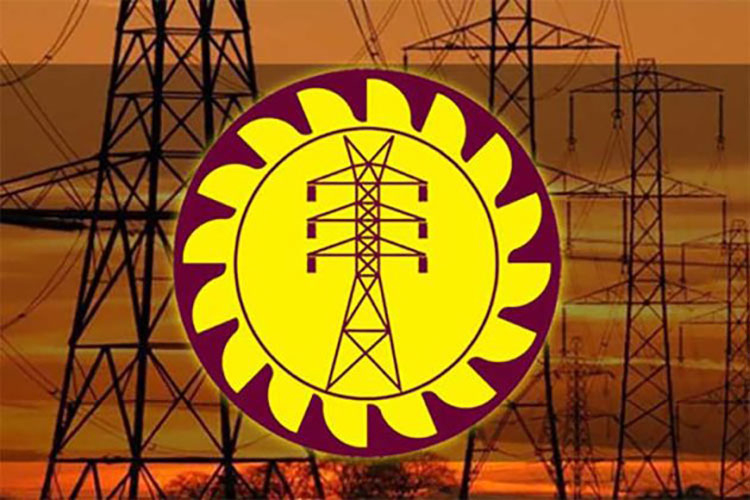
A simmering confrontation between the government and the powerful Ceylon Electricity Board (CEB) trade unions intensified yesterday, with the latter signalling continued industrial action, even as authorities moved decisively to prevent any disruption to electricity supply.
The dispute centres on the government’s determination to restructure and unbundle the CEB under amendments to the Electricity Act, a reform drive officials describe as unavoidable to curb losses, strengthen governance and stabilise the national power sector. This has also been a long-standing demand of international donors, particularly the International Monetary Fund and the World Bank.
Some 24 CEB unions, including powerful engineers’ and workers’ organisations, have rejected the move, warning that the proposed restructuring could weaken institutional coordination, undermine job security and eventually place additional pressure on consumers.
Union representatives said work-to-rule campaigns and other limited forms of industrial action would continue, despite electricity services being declared an essential service — a legal measure that effectively curtails full-scale strike action.
“These reforms are being imposed without proper consultation. Decisions taken in haste could have serious consequences for grid stability and public confidence,” a senior union official told The Island.
The government, however, has adopted a firm posture, cancelling all categories of leave for CEB staff and directing management to ensure uninterrupted operations across generation, transmission and distribution.
A senior official at the Power and Energy Ministry said the administration would not allow labour unrest to jeopardise electricity supply, stressing that energy security was central to economic recovery.
“Electricity is a critical public service. Any attempt to disrupt supply will be dealt with firmly,” the official said.
Engineers’ unions have separately cautioned that restructuring without a clearly articulated technical and regulatory framework could compromise long-term planning and system reliability, though they have stopped short of calling for an outright shutdown.
Despite ongoing discussions between union leaders, CEB management and government representatives, there is no indication of an early resolution, raising the prospect of a prolonged standoff at one of the country’s most strategically important state institutions.
The dispute unfolds amid Sri Lanka’s IMF-backed reform programme, under which state-owned enterprises — particularly in the energy sector — are under increasing pressure to reduce losses and ease the burden on public finances.
Analysts warn that sustained unrest at the CEB could complicate reform timelines and dent investor confidence, even as the government seeks to signal policy resolve.
A retired CEB top official said: “For now, while major strike action remains legally constrained, the confrontation has once again placed the power sector at the centre of national debate, with consumers and businesses watching closely for any fallout.”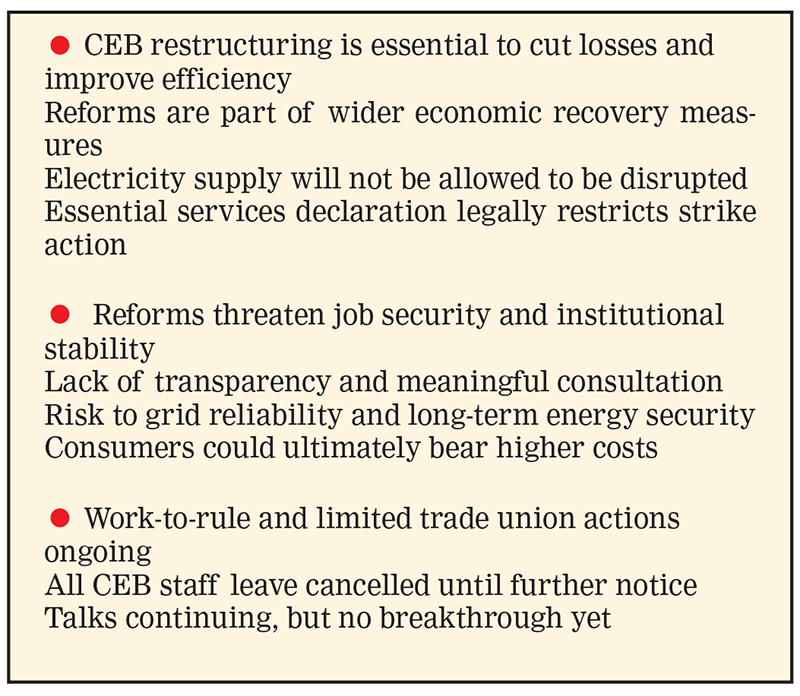
By Ifham Nizam ✍️
News
Dumbara Prison being expanded to accommodate nearly 30,000
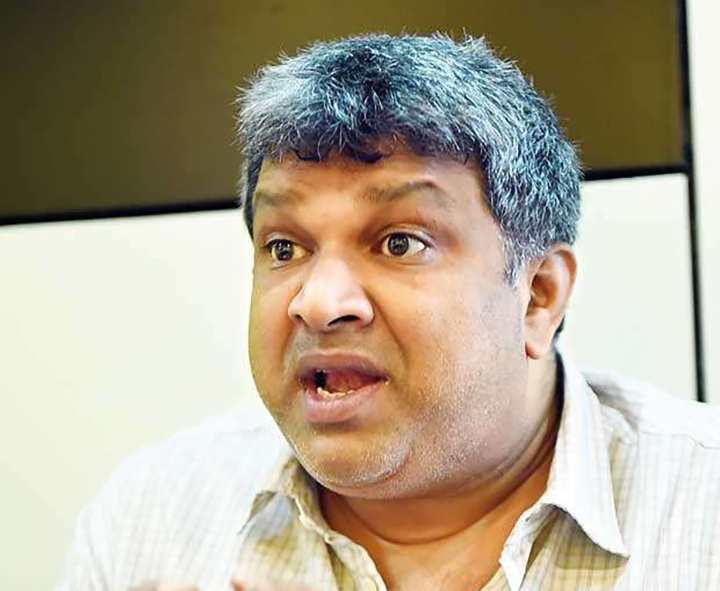
Of over 37,000 held in country’s prisons, nearly 27,000 are suspects
Dumbara Prison built to accommodate 699 persons is now being expanded to hold 2,900 persons. At the moment, Dumbara Prison holds 2,246 men and women – a staggering 1,547 individuals more than its maximum capacity. Of the 2,246 persons held there, 107 are females.
This was revealed when Justice and National Integration Minister Harshana Nanayakkara responded to a query posed by Samagi Jana Balawegaya (SJB) lawmaker Chamindrani Kiriella, in Parliament yesterday (20).
The Kandy district SJB MP raised a spate of questions regarding the current status of prisons with the focus on how the NPP government intended to address the growing congestion within prisons.
The Minister explained that a major building project was now underway to expand Dumbara Prison, situated at Pallekelle, to accommodate 2,500 men and 400 women.
According to Attorney-at-Law Nanayakkara, the proposed Dumbara Prison complex would include 102 housing units for prison personnel.
The Parliament was told that the entire project would cost the taxpayer a staggering Rs 4.3 bn and that Engineering Consultants (Pvt.) Limited (ECL) was responsible for planning and supervision.
The project was progressing and by January 4, 2026, a substantial part of the complex had been built and 2146 inmates already accommodated.
The Minister said that the facility was to accommodate those who were previously held at Nuwara and Bogambara Prisons.
Of some 37,761 held at various prisons, about 27,000 were suspects, the Parliament was told.
MP Kiriella urged Minister Nanayakkara to consider an arrangement, similar to that of South Africa where those languishing in prisons, due to the inability to pay fines, received the required financial assistance from a special fund created for that purpose.
While appreciating the SJB’ers proposal, Minister Nanayakkara said that during 2025, 17,000 persons hadn’t been remanded as part of the government response to overcome overcrowding in prisons. They were being held under supervision, the Minister said.
Minister Nanayakkara said that the primary reason for the congestion was the significant number of those remanded on narcotics-related charges. Of the over 37,000 held in prisons about 30,000 were those who had been arrested on narcotics-related offences, the Minister said. According to the Minister, delay on the part of the Government Analyst’s Department in furnishing relevant reports had created a crisis and action was being taken to recruit 82 persons to that Department. The idea was to establish a system to secure GA reports within three months, the Minister said.
By Shamindra Ferdinando ✍️
-

 Editorial3 days ago
Editorial3 days agoIllusory rule of law
-

 News4 days ago
News4 days agoUNDP’s assessment confirms widespread economic fallout from Cyclone Ditwah
-

 Business6 days ago
Business6 days agoKoaloo.Fi and Stredge forge strategic partnership to offer businesses sustainable supply chain solutions
-

 Editorial4 days ago
Editorial4 days agoCrime and cops
-

 Features3 days ago
Features3 days agoDaydreams on a winter’s day
-

 Editorial5 days ago
Editorial5 days agoThe Chakka Clash
-

 Features3 days ago
Features3 days agoSurprise move of both the Minister and myself from Agriculture to Education
-

 Features2 days ago
Features2 days agoExtended mind thesis:A Buddhist perspective













